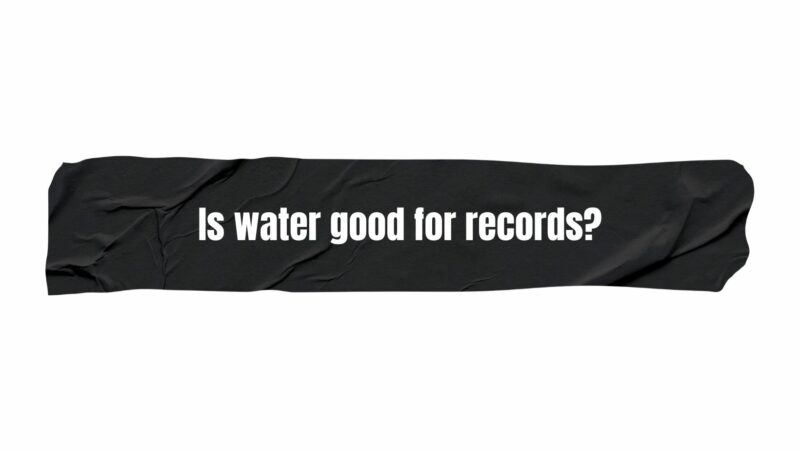Vinyl records hold an iconic place in the realm of music, evoking a sense of nostalgia and authenticity that resonates with audiophiles and collectors. The tangible and tactile experience of placing a record on a turntable, dropping the stylus, and immersing oneself in the rich sound is an irreplaceable joy. However, an ongoing debate revolves around the question: Is water good for records? This article delves into the intricate relationship between water and vinyl records, exploring the potential benefits, pitfalls, and considerations when it comes to using water for maintenance.
Understanding Vinyl Records: To grasp the nuances of water’s impact on vinyl records, it’s vital to comprehend the composition and structure of these musical relics. Vinyl records are crafted from polyvinyl chloride (PVC), a pliable material that reacts to environmental factors such as temperature changes, humidity, and liquid exposure. The grooves etched onto the record’s surface hold the delicate audio information, and any disruption to these grooves can profoundly influence playback quality.
The Promise of Water: Water, an elemental force essential to life, carries the promise of cleanliness and restoration. Given vinyl records’ susceptibility to dust, debris, and the gradual accumulation of contaminants, the idea of using water to cleanse and rejuvenate these treasures holds a certain allure. Yet, as with any delicate balance, water’s potential benefits must be weighed against potential risks.
The Debate: Good vs. Harmful: The debate over whether water is good for records hinges on several factors, including the type of water used, the method of application, and the overall condition of the records. Water can indeed be beneficial for vinyl records under controlled circumstances and when employed judiciously for specific purposes.
Using Water for Cleaning:
- Distilled Water: The use of distilled water is paramount when considering water’s role in record cleaning. Distilled water lacks impurities and minerals that could potentially harm records. When mixed with a specialized vinyl cleaning solution, distilled water can create a gentle and effective cleaning agent.
- Dilution and Application: The mixture of distilled water and cleaning solution should be applied in a controlled manner. It should be sparingly applied to a lint-free cloth or cleaning pad. Gentle wiping in the direction of the grooves helps remove dirt without compromising the record’s structure.
- Avoiding Excess Moisture: Excess moisture should be avoided to prevent water from seeping into the grooves and causing damage. Promptly drying the record with a dry, lint-free cloth after cleaning is essential.
Potential Benefits of Water Usage:
- Surface Cleaning: Water, when used appropriately, can effectively remove surface dust, debris, and light contaminants from vinyl records. This can contribute to maintaining sound quality and prolonging the life of the records.
- Reviving Neglected Records: For records that have been neglected or exposed to significant dust and dirt, controlled water usage in conjunction with proper cleaning techniques can help restore their playability.
Potential Pitfalls and Considerations:
- Water Damage Risks: The primary concern with water usage lies in the potential for water to seep into the grooves, leading to surface noise, skipping, and even mold growth if not dried properly.
- Alternative Cleaning Methods: While water has its merits, alternative cleaning methods such as dry brushing, record cleaning solutions, and record cleaning machines may provide safer and more effective means of maintenance.
- Professional Assistance: In cases of severe contamination or damage, seeking professional record cleaning services ensures the delicate balance between cleaning and preserving the record’s structure.
Conclusion: The question of whether water is good for vinyl records is multifaceted, with both potential benefits and risks to consider. When approached with caution, distilled water can play a role in maintaining vinyl records’ cleanliness and extending their lifespan. The delicate grooves that carry the soul of the music deserve meticulous care, and water can be a part of that equation when utilized with precision. As audiophiles and collectors continue to cherish the magic of vinyl records, the informed use of water contributes to the harmonious balance between preservation and the joy of reliving the melodies of yesteryears.


